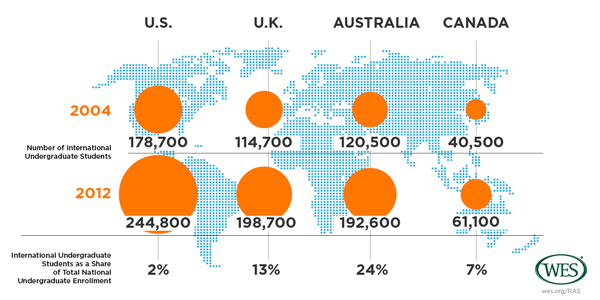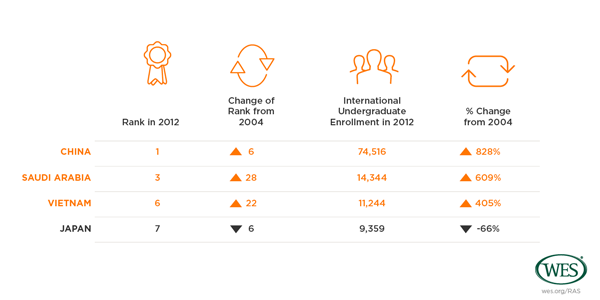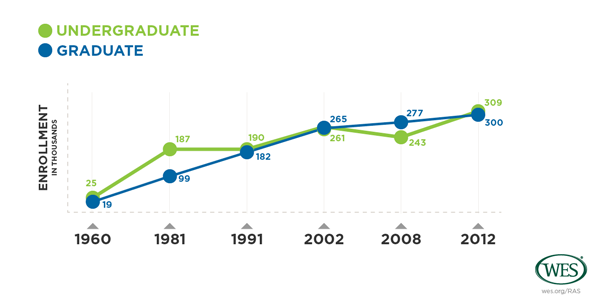Li Chang, Research & Advisory Services, WES
The latest report from WES Research & Advisory Services [1] indicates that the global student mobility landscape is driven by students at the undergraduate level.
Comparative Trends in International Undergraduate Enrollment, 2004 vs. 2012
 [2]Four countries have significantly increased their intake of international undergraduate students between 2004 and 2012. However, the U.S. has the greatest potential for overall growth in the international undergraduate market.
[2]Four countries have significantly increased their intake of international undergraduate students between 2004 and 2012. However, the U.S. has the greatest potential for overall growth in the international undergraduate market.
International Students in the U.S By Level of Study, 1960-2012
International graduate enrollments trailed undergraduate enrollments between 1960 and 1991, and then remained on a level track until 2002 when both reached roughly a
quarter million. From 2002 to 2008, graduate enrollments grew slowly while international undergraduate numbers declined. In 2012, the number of international undergraduate students once again surpassed those at the graduate level.
Shift of International Undergraduate Students from Selected Top Source Countries in the U.S., 2012 vs.2004
 [4]This shift is a result of socioeconomic and demographic changes in the source countries, such as the rising purchasing power of Chinese and Vietnamese families, government-funded students from Saudi Arabia, and population decline in Japan.
[4]This shift is a result of socioeconomic and demographic changes in the source countries, such as the rising purchasing power of Chinese and Vietnamese families, government-funded students from Saudi Arabia, and population decline in Japan.
The Interplay of Responsive Strategy
The responses from WES’ survey suggest that current institutional priorities are focused on achieving aggressive, diverse, and efficient international enrollment growth.
Thus, we recommend a framework for responsive strategies that emphasizes the interplay of technology, partnership, and research.
Sources: Institute of International Education (IIE); Higher Education Statistics Agency (HESA); Department of Education, Employment and Workplace Relations (DEEWR); Statistics Canada (SC); WES Research & Advisory Services fall 2012 survey.
Previous issues of Mobility Monitor
- Will U.S. Enrollments Among Nepali Students Rebound? [6]
- UK Students Going Abroad in the Quest for Best Value [7]
- Using Social Media to Recruit in Emerging Markets [8]
- Meet the Explorers – An Emerging International Student Segment [9]
- Is There a New Wave of Indian Undergraduate Students Heading to the U.S.? [10]


